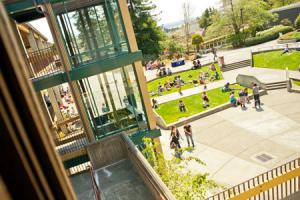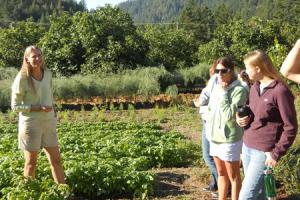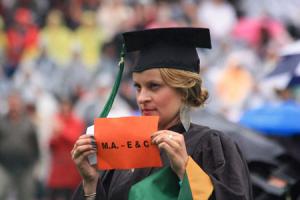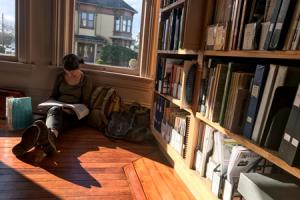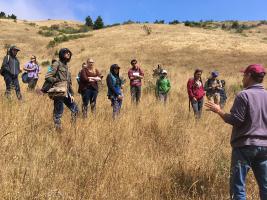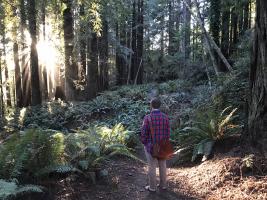Spring 2012
Unless otherwise noted, events are 5:30pm-7:00pm Thursdays in Gist Hall 218
Antwi Akom
February 16
Race, Power, and the Environment: Using Participatory Mapping and New Media to Build a Community-Based Climate Justice Movement”
watch full presentation
Dr. Akom is an Associate Professor of Environmental Sociology, STEM Education, and African American Studies at San Francisco State University and during 2011 has been a Visiting Research Scientist at the Lawrence Berkeley National Laboratory. In 2011 he founded the Institute for Sustainable Economic, Educational, and Environmental Design (ISEEED) which focuses on creating sustainable cities and schools so that people do not have to leave their communities in order to live, learn, work, and thrive. As a national leader in integrating youth development, workforce development, STEM education, and culturally responsive pedagogy, Dr. Akom’s solution-driven models help train the next generation of climate scientists and introduce new frameworks for reducing health and educational disparities, alleviating poverty, and competing in the 21st century clean energy economy. Dr. Akom has received numerous national awards. His forthcoming books are Building Sustainable Cities and Schools and Redemptions Songs: New Visions of Race, Schooling, and Sustainability.
Zack Zoller
February 23
“Solar Makes it Big: Scaling Up Solar Photovoltaics for Large Systems”
watch full presentation
Zack Zoller is an Engineering Project Manager at Blue Oak Energy in Davis, California. He is a graduate of UC Davis with a BS in Mechanical Engineering and a Masters in Engineering. Zack has 5 years of experience in the Solar Photovoltaic Industry designing small and large commercial and utility scale generation systems. He was the lead designer on the 36 MW Long Island Solar Farm, which was recently commissioned and is feeding power into the grid. His current project is in Illinois with a 20MW plant selling power to the local utility company.
Lindsay Magnuson
March 1
“Land Conservation on the North Coast Using the Land Trust Model”
watch full presentation
Lindsay has been the Executive Director of the Northcoast Regional Land Trust (NRLT) for the last two years. NRLTis dedicated to the protection and economic viability of working landscapes, farms, forests and grazing lands, and to the preservation and protection of land for its natural, educational, scenic and historic values. NRLT is focused on the nearly five million acres on California’s North Coast encompassing Humboldt, Del Norte, and Trinity Counties. Lindsay was born and raised in Humboldt County and has a unique perspective on the opportunities and challenges of working to conserve land while preserving the rural culture of this region. She brings a wealth of leadership experience to NRLT spanning community development and conservation projects in West Africa to lecturing for five years at Cal Poly Humboldt and College of the Redwoods. Lindsay earned her Bachelor’s degree in Wildlife Management from Cal Poly Humboldt and a Master’s degree in Natural Resources from Humboldt while focusing on the ecology and conservation of Roloway monkeys in Ghana (2002). Lindsay was given the Koplin award for outstanding Wildlife graduate of the year in 2003.
Simone Pulver
March 8
“Addressing Climate Change through Carbon Markets: Lessons Learned in Brazil and India”
watch full presentation
Simone Pulver is an Assistant Professor of Environmental Studies at the University of California, Santa Barbara. She received her doctorate in Sociology from the University of California, Berkeley. Pulver has been analyzing international climate policy for the past 15 years, including a year as a Fulbright fellow at Jawaharlal Nehru University in New Delhi, India. Her current research examines private sector responses to climate change in emerging economies.
Robin Kimmerer
March 22
“Restoration and Reciprocity: Finding Common Ground Between Traditional and Scientific Ecological Knowledge”
Dr. Kimmerer is a mother, scientist, writer and Distinguished Teaching Professor of Environmental Biology at theSUNY College of Environmental Science and Forestry in Syracuse, New York and the founding Director of the Center for Native Peoples and the Environment whose mission is to create programs which draw on the wisdom of both indigenous and scientific knowledge for our shared goals of sustainability. Her research interests include the role of traditional ecological knowledge in ecological restoration and building resilience for climate change. In collaboration with tribal partners, she and her students have an active research program in the ecology and restoration of plants of cultural significance to Native people. She is active in efforts to broaden access to environmental science training for Native students, and to introduce the benefits of traditional ecological knowledge to the scientific community, in a way that respects and protects indigenous knowledge.
Garvin Heath
April 5
“Environmental Impacts of Energy Technologies: A Life Cycle Perspective”
watch full presentation
Garvin Heath is a senior scientist in the Strategic Energy Analysis Center of the National Renewable Energy Laboratory (NREL). At NREL he specializes in analyzing the environmental impacts of energy systems using the tools of life cycle assessment, air quality modeling, and sustainability analysis. He received his PhD in Energy and Resources from the Energy and Resources Group of the University of California, Berkeley in 2006. He also holds an MS degree in Environmental Engineering from UC Berkeley. His previous professional experience includes five years with the Indoor Environments Division of the US EPA, in addition to various assignments with researchers at Lawrence Berkeley National Laboratory and Environmental Defense. He currently resides in Boulder, CO where he also holds an adjunct research position at the University of Colorado at Boulder.
Kathleen McAfee
April 12
“Cooling the Planet or Feeding the World: Do We Have To Choose?”
watch full presentation
Kathleen McAfee is a geographer (UC Berkeley) who has been a policy analyst for Oxfam and a consultant to UN agencies. She has authored a book, Storm Signals: Structural Adjustment and Development Alternatives, and many articles on environment, hunger, agriculture, trade, and development. Before joining the International Relations Department at San Francisco State University, Dr. McAfee taught at Yale and held the Fulbright Canada Research Chair in Sustainability. She maintains ties with NGOs and farmers organizations working to end hunger worldwide.
Seth Wilson
April 19
“Conservation on the Edge: Large Carnivores and Building Communities of Coexistence”
Seth Wilson is a Visiting Fellow at the Yale School of Forestry and Environmental Studies. His research and applied conservation efforts focus on large-carnivore conservation, policy, human-wildlife conflict, landscape-scale conservation, and conservation planning on private lands. He is currently working on a multi-year research project involving a community-supported conservation plan to reduce human-grizzly bear and wolf-livestock conflicts on private agricultural land in Montana. In addition to conducting research, he works with conservation organizations including the Blackfoot Challenge and People and Carnivores. He holds a B.A. in Environmental Studies and Government from St. Lawrence University, a M.S. in Science from the Environmental Studies Program, and a Ph.D. from the College of Forestry and Conservation at the University of Montana. He is a Team Member of the IUCNHuman-Bear Conflict Specialist Group and member of the Yale Large Carnivore Group.
Miguel Altieri- EVENT CANCELLED
May 3
“Who Will Feed Us in a Planet in Crisis?”
Dr. Miguel A . Altieri is a professor of agroecology in the Department of Environmental Science, Management and Policy at the University of California, Berkeley. Dr. Altieri has served as a Scientific Advisor to the Latin American Consortium on Agroecology and Development (CLADES) Chile, an NGO network promoting agroecology as a strategy for small farm sustainable development in the region, and as the General Coordinator for the United Nations Development Programme’s Sustainable Agriculture Networking and Extension Programme which aimed at capacity building on agroecology among NGOs and the scaling-up of successful local sustainable agricultural initiatives in Africa, Latin America and Asia. In addition, he was the chairman of the NGO committee of the Consultative Group on International Agriculture Research whose mission was to make sure that the research agenda of the 15 International Agricultural Research Centers benefited the poor farmers of the world. Currently, he is advisor to the FAO-GIAHS program (Globally Indigenous Agricultural Heritage Systems), a program devoted at identifying and dynamically conserving traditional farming systems in the developing world. He is the author of more than 200 publications, and numerous books including Agroecology: The Science of Sustainable Agriculture and Biodiversity, Pest Management in Agroecosystems, and Agroecology and the Search for a Truly Sustainable Agriculture.

